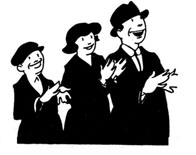
The Ideology of Diverse Families
DECONSTRUCTING THE HEARTH & THE HEART
Howard Pyle’s The Wonder Clock (1887), a collection of folk tales and fairy tales with illustrations that depict the various scenes of a 24-hour period in a typical home of the time, organizes the stories according to the hours of the day, beginning at 1:00 AM.
One of the Clock, and silence deep / Then up the Stairway, black and steep / The old House-Cat comes creepy-creep / With soft feet goes from room to room / Her green eyes shining through the gloom / And finds all fast asleep.
The setting of the stories is a household that provides domestic comforts, simple pleasures, and a variety of sources of contentment, all on a modest scale. Even the hour of one o’clock in the morning is not devoid of its exquisite moments and special sense of peacefulness. The gleaming green eyes of the cat and its feline movements punctuate the darkness with a beautiful light and a natural movement that is reassuring of a familiar, human world which always feels like home. Two o’clock in the darkness also is not dreary darkness or lifeless immobility, for a black bird crows, and a red cock answers as the moon shines brightly. The universe is not a cold, impersonal place. Inside the home, Gretchen “Turned in bed,/ And tossed her arms/ Above her head” as the dog stretches: “And, breathing deep,/ He settled down/ Again to sleep.” So Gretchen and the hound, turning and stretching, settle into their favorite positions and enjoy the sweetness of sleep in the cozy snugness of home. In the dead of night at three o’clock, the rooms are feeling cold as the ashes in the fireplace die, but life goes on even in darkness and sleep: “The Board-Floor creaked,/ The Grey-Mouse squeaked,/ And the Kobold dreamed its ear he tweaked.” There is never a lack of activity, a sound of life, a touch of humor, or something happening in this world of the home, even though the busyness of the day has passed and the time of rest has arrived. Floors creaking, creatures stirring, sleepers dreaming, fires glowing — the nighttime realm stirs with its own round of normal business and brims with its own unique sounds, sights, and movements. Every hour has its pleasure, and both night and day offer appetizing, welcoming delights. This is the poetry of the home, the song of daily life in its ordinary rounds around the clock.
You May Also Enjoy
When one considers the sublime fine-tuning of the universe as Denton describes it, the conclusion of a Designer is hard to resist.
Father Coughlin was heard by hundreds of thousands, and had become, really, a preacher much involved in the politics of his day, the 1930s.

